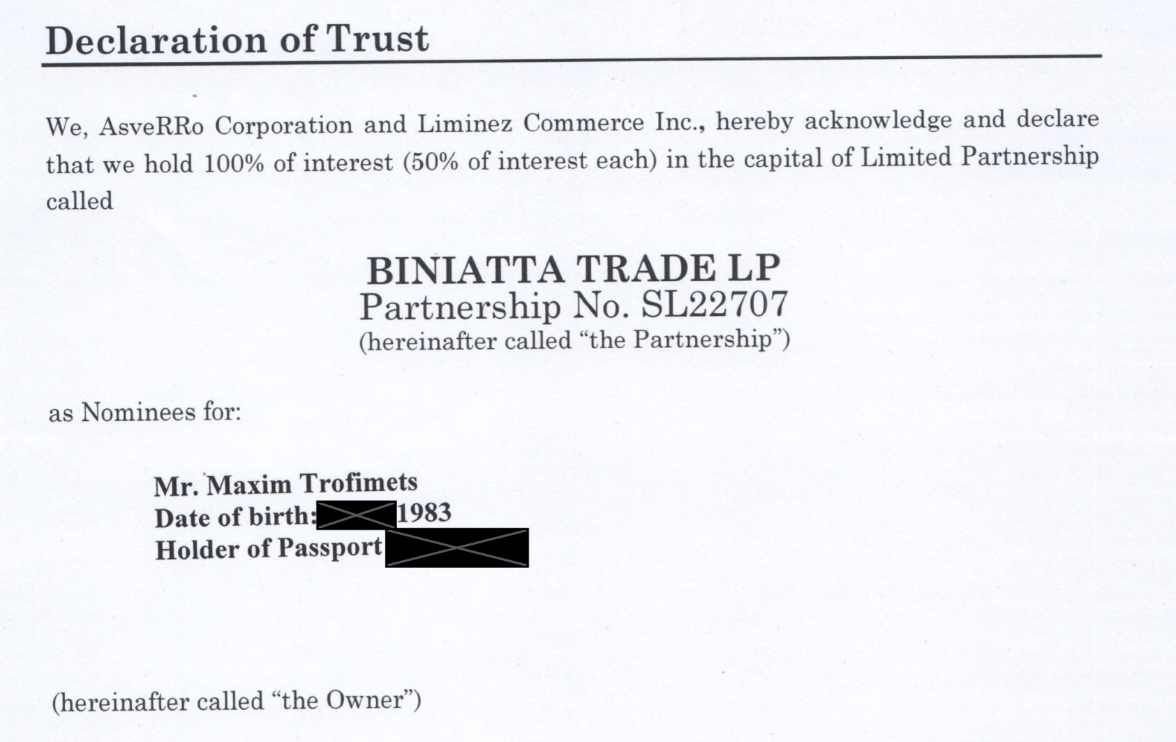
Five years ago, Mother Jones broke a wild story: A mysterious Scotland-based shell company had paid a GOP-linked American lobbyist to help a presidential candidate in Albania court support from the Trump administration—and the money was apparently tied to Russia. Now a new piece of the puzzle has materialized.
In 2017, Nick Muzin—a former aide to Sen. Ted Cruz (R-Tex.) who became a well-connected and highly paid lobbyist—reported in filings with the Justice Department that he had been hired to win backing in the United States for Lulzim Basha, the head of the center-right Democratic Party of Albania (DPA), who was then challenging the incumbent prime minister of Albania. There was nothing unusual about a DC-based influence peddler being retained by a foreign politician. But a $150,000 payment for Muzin’s services had come from a bizarre source: Biniatta Trade LP, a shell company registered in Scotland by two other shell companies based in Belize.
Biniatta Trade had a convoluted chain of corporate relationships. Those based-in-Belize companies were listed in corporate filings as officers of yet two other firms, and those two companies were controlled by Russian nationals. Moreover, there was no public sign that Biniatta Trade did anything. Its website, registered by a resident of Odessa, Ukraine, was comprised of stock images and boilerplate language. The British phone number it listed did not work. It appeared to be a front. We couldn’t tell for who or for what. But the corporate links tracked back to Russia.
The story—a strong indicator that a person or entity in Russia was using an American lobbyist to influence an election in Albania—generated front-page headlines in Albania. The possibility of secret Russian intervention made sense. Basha’s party opposed the government led by Prime Minister Edi Rama, who had been steering Albania into the European Union and warning of the rise of Russian influence in the Balkans. Moscow certainly had an interest in Basha ousting Rama.
The DPA denounced the article and Mother Jones, claiming the piece was part of a conspiracy involving billionaire philanthropist George Soros. Eventually, Albanian prosecutors charged Basha with money laundering and falsifying documents in connection with the matter. That prosecution was later suspended. The controversy oddly came up in the case of Charles McGonigal, the former head of the FBI counterintelligence division in New York who pleaded guilty in September to crimes that included accepting a $225,000 loan from a Rama ally and then ordering up an FBI investigation of US lobbying efforts conducted on behalf of Basha.
Last year, a State Department report offered a strong suggestion that the Biniatta Trade payment to Muzin was part of an international clandestine Russian influence operation. In a summary of a US intelligence review, the department said that the Kremlin since 2014 had slipped at least $300 million to political parties and politicians outside Russia “to shape foreign political environments in Moscow’s favor.” An administration source familiar with the report told the AFP that Russia “spent around $500,000 to back Albania’s center-right Democratic Party in 2017 elections.” (Muzin also received a $500,000 payment connected to his Albanian lobbying; the origins of these funds are disputed.)
“We have been clear about our concern about Russia’s activity to influence the democratic process in various countries around the world, including our own,” a State Department spokesman at the time told Mother Jones, in response to questions regarding the Albanian funding. “Our concern over Russia’s activity in this regard is not with any one country, but global in nature as we continue to face challenges against democratic societies.”
The Russian role in the Albanian lobbying matter, by then, looked increasingly clear. But a key question remained: Who exactly in Russia was behind it?
Earlier this month, a team of investigative reporters at the BBC, the Seychelles Broadcasting Corporation, and Finance Uncovered solved part of the mystery. They discovered that the Scottish shell company that paid for Muzin’s lobbying in the US for Basha was owned by a Moscow resident.
These journalists are part of an international consortium that has been plowing through the Pandora Papers, a massive trove of leaked files from more than a dozen corporate services firms—companies that create and administer offshore firms that help high-wealth clients move and hide money. Though first revealed in 2021, the papers, which include almost 12 million files, are still spilling secrets.
This team of investigative reporters recently dug into documents from one of the companies whose files are included in the Pandora Papers: Alpha Consulting. That firm, based in the Seychelles and owned by a Russia citizen named Victoria Valkovskaya, sets up secretive offshore companies for its clients, many in the former Soviet Union, reportedly including members of Russian leader Vladimir Putin’s inner circle.
Biniatta Trade was among the shell companies created by Alpha Consulting, which used complex corporate structures in what appears to be a deliberate effort to conceal the real owners of the firms it concocted. Within the Pandora Papers is a September 28, 2015, private agreement that listed a 40-year old Muscovite named Maxim Trofimets as Biniatta Trade’s owner.

The reporters who pursued this story did not learn why Trofimets was registered as owning Biniatta. They noted that Trofimets began working in 2018 as a sales director at a Russian helicopter company called Exclases Holding. That company says it sells to clients helicopters that are manufactured by an Italian firm. According to a press release put out by that Italian helicopter manufacturer, Exclases participated in a 2012 deal to provide three helicopters to an unnamed Russian government agency for carrying out “special security missions.”
The leaked documents indicate that Alpha Consulting attempted to keep Trofimets’ control of Biniatta secret. A 2017 law attempting to promote increased transparency among Scottish corporations requires firms registered in Scotland to disclose their real owners, or “persons with significant control.” On September 27, 2017, Alpha declared in a form sent to Scottish regulators that no one had such control over Biniatta. The next day it quietly completed another document, found among the trove of leaked Pandora Papers, stating that Trofimets controlled the company.
After Mother Jones’ report on Biniatta appeared in March 2018, Valkovskaya moved to rejigger Biniatta’s complex ownership. She switched control of the company to firms located in the Marshall Islands. Those Marshall Islands firms were run by a foundation controlled by five directors, all Seychelles citizens. In an email to associates, cited by Finance Undercover and the other outlets, Valkovskaya wrote that the owner of Biniatta was “a private Seychelles foundation, in which there are five councillors,” and, thus, there was no need “to declare a controlling person” to regulators.
A lot remains murky. The newly discovered documents reveal that a Moscow businessman was running a Scottish shell company that was paying for lobbying in the United States to help an Albanian party that was challenging a government headed by a prime minister opposed to Putin. But was Trofimets a front for the real source of the money that went to Muzin?
Neither Trofimets nor Valkovskaya responded to Mother Jones‘ inquires. Muzin, who said in 2018 that he believed Biniatta was a private company owned by DPA supporters, did not respond to a request for comment.
This new information unearthed from the Pandora Papers is more proof that the payment Muzin received was linked to a Russian influence project. This particular operation was part of that larger clandestine effort that included Russia’s successful attempt to help Trump win the White House in 2016. As Trump and his allies keep insisting that Russian interference was all a hoax, evidence to the contrary keeps emerging.
Update, December 16: This article has been revised to correct the date of the private agreement listing Trofimets as the owner of Biniatta Trade. The article has also been revised to clarify details of the helicopter deal involving Exclases and Exclases’ subsequent employment of Trofimets. After this article was published, Exclases provided the following statement: “Exclases is an International organisation. It confirms that Mr. [Trofimets] was not employed by Exclases until 2018 and his employment was suspended in February 2022, shortly after the Russian invasion of Ukraine, then terminated in November 2022. Exclases emphasises that that it has not had any involvement with Biniatta Trade, and that it has not engaged in any illegal or improper sales. Exclases also denies having ever said that it sells Italian helicopters to an ‘unnamed Russian government agency’ for ‘special security missions’ – this phrase may have been used by a third-party but it related to a sale that took place in 2012.”















